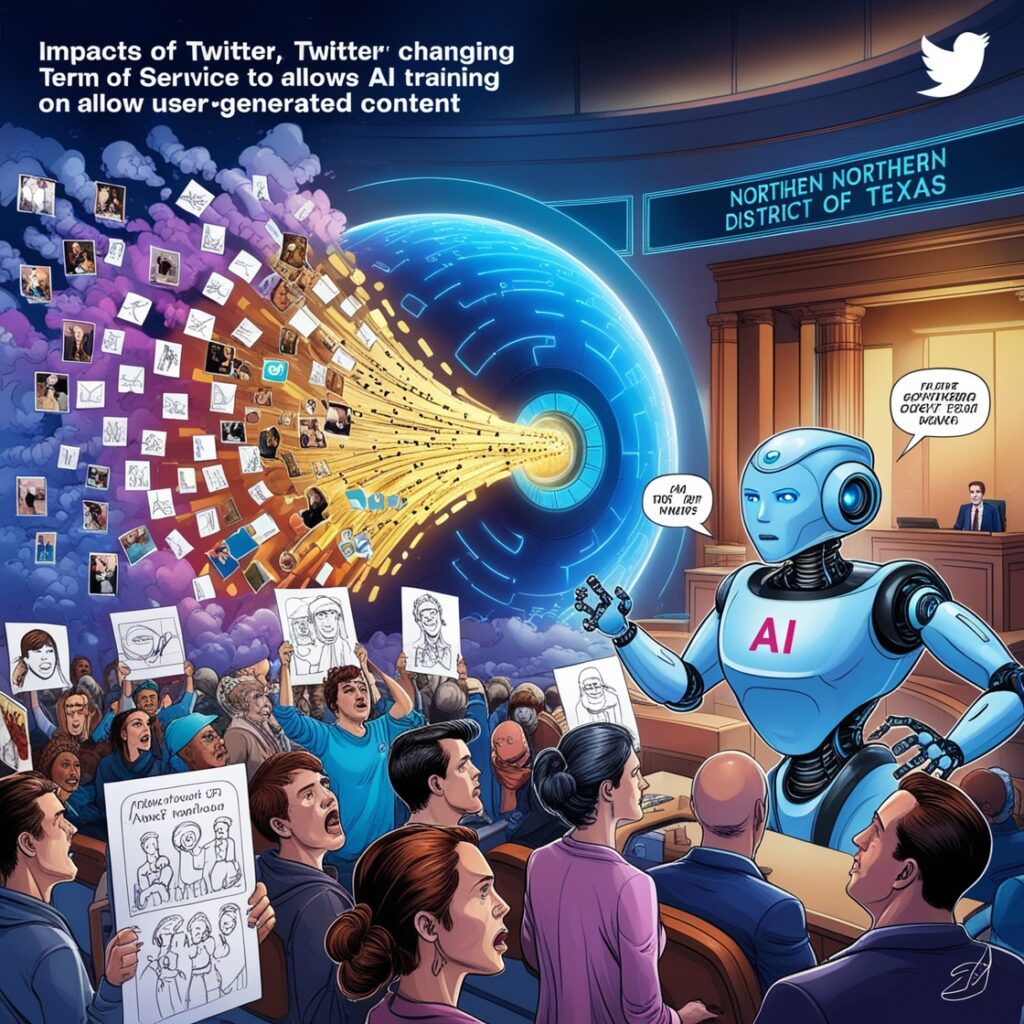Introduction
In recent news, X, formerly known as Twitter, has made a significant update to its terms of service that has sent shockwaves through its user base. As artificial intelligence (AI) continues to grow in influence, social media platforms are increasingly integrating AI into their operations. However, X’s decision to allow the use of user-generated content to train its AI models has raised concerns, sparking intense debate among users. This article delves into the recent changes to X’s terms of service, the implications for data privacy, and the legal challenges ahead.
Table of Contents
- Background of the Terms of Service Change
- Key Changes in X’s Terms of Service
- Global License Grant
- Implications for AI Training
- Why This Change Matters
- Artists and Creators: Losing Control?
- Users’ Personal Information at Risk
- The Legal and Jurisdictional Shift
- Why the Northern District of Texas?
- The Impact of Favoring Conservative Courts
- Data Privacy Concerns
- Grok: X’s Controversial AI Chatbot
- Can Users Still Opt Out of AI Training?
- Industry-Wide Implications of AI and Content Use
- Google and Microsoft’s AI Missteps
- Comparing X’s Policies to Other Platforms
- Conclusion: What Can Users Do?
Background of the Terms of Service Change
The rise of AI has significantly transformed industries across the globe, including social media. X, one of the largest platforms in the world, is no stranger to this technological wave. Since its rebranding from Twitter to X, the company has been actively pursuing AI integration in various facets of its operations.
On November 15, 2024, X plans to roll out its updated terms of service, which includes a notable clause that grants the platform the right to use users’ posts and other forms of content for AI training. This change has raised eyebrows, especially as the platform’s AI-driven initiatives expand rapidly.
In a nutshell, X’s new terms of service state that by continuing to post on the platform, users will be agreeing to allow the platform to use their data, including tweets, photos, and other content, to train its AI models. This development has raised several ethical and legal concerns, especially among artists, creators, and regular users who value their privacy.
Key Changes in X’s Terms of Service
Global License Grant
In the updated terms, X outlines a significant change in its data usage policy. The most contentious part of this update is the “worldwide, non-exclusive, royalty-free license” clause. This means that X can use any content shared on its platform, be it tweets, photos, or videos, for purposes beyond the user’s control.
H2: Implications for AI Training
The most concerning aspect of this license is that it includes the right for X to use the data to train its machine learning and AI models. The terms explicitly state that this includes “for use with and training of our machine learning and artificial intelligence models, whether generative or another type.” This means that any post, regardless of content, can be used to improve X’s AI capabilities, without direct permission from the user.
Why This Change Matters
Artists and Creators: Losing Control?
One of the most vocal groups opposing these changes are artists and other content creators. On X, users like illustrators, photographers, and writers express concern that their creative work could be exploited to teach AI models that could one day replicate their unique styles or ideas.
For instance, an artist might post original illustrations or animations on X. Under the new terms, X could use that work to train its AI to create similar images. This could result in AI-generated works that compete with human artists, undermining their professional value and potentially impacting their livelihood.
Users’ Personal Information at Risk
Beyond the artistic community, everyday users are worried about the potential misuse of personal information. By allowing X to access and analyze all content, users fear that their personal details, opinions, and even sensitive information could be used in ways they never intended.
Some users have already begun deleting images of themselves from their profiles, attempting to protect their personal identity from being caught up in the AI training process. However, given the sheer volume of data that X holds, it remains unclear whether these actions will be enough to safeguard user privacy.

The Legal and Jurisdictional Shift
Why the Northern District of Texas?
Another point of contention in the updated terms of service is the stipulation that all disputes regarding these terms will be handled by the US District Court for the Northern District of Texas. For many users, this decision feels arbitrary, especially given that X’s headquarters is located more than 100 miles away from this jurisdiction.
This legal choice has raised questions about why X chose a district so far removed from its operations. The answer, some speculate, lies in the political leanings of the court. The Northern District of Texas has gained a reputation for favoring more conservative rulings, which might offer X a more favorable legal environment in case of challenges from users.
The Impact of Favoring Conservative Courts
Choosing this court aligns with Elon Musk‘s legal strategy of handling disputes in more conservative arenas. Two lawsuits involving X are already being presided over by this court, which suggests that Musk is confident in the district’s conservative stance.
For users, this presents a significant disadvantage. Filing a lawsuit in a court far from their location could be more challenging, expensive, and intimidating, potentially discouraging them from seeking legal recourse in the event of disputes over data privacy or other issues.
Data Privacy Concerns
Grok: X’s Controversial AI Chatbot
X’s AI-driven chatbot, Grok, has already been a subject of controversy. The chatbot has been criticized for spreading misinformation, including inaccuracies about the 2024 election and even generating violent and graphic images of political figures.
Now, with X’s terms of service update, users are concerned about the potential risks of allowing the platform access to even more data. Grok’s previous errors highlight the dangers of AI misuse, and many fear that granting X further access to personal posts will only exacerbate these issues.
Can Users Still Opt Out of AI Training?
Before the most recent update, X users could opt out of having their data shared for AI training. This option could be found in the platform’s settings, under the “privacy and safety” section. Users could disable data sharing under a header titled “Grok,” thus preventing their posts from being used to train AI models.
However, with the updated terms of service, it is unclear whether this opt-out option will remain. The broad and sweeping language of the new terms suggests that X can now license and use all content shared on the platform for AI purposes, leaving users with little control over how their data is used.
While some legal experts speculate that users may still have some form of opt-out option, the new terms give X more leeway than ever before, and it is uncertain whether the platform will honor previous user preferences.
Industry-Wide Implications of AI and Content Use
Google and Microsoft’s AI Missteps
X is not the only company facing backlash over its use of user data for AI training. Google and Microsoft have also been criticized for their AI tools, which have occasionally produced results that were inaccurate, inappropriate, or outright bizarre.
For instance, Google’s Bard AI and Microsoft’s ChatGPT have been known to generate misleading information or offensive content. The fact that major companies are still struggling to control their AI products raises concerns about X’s ability to manage its own AI-driven initiatives effectively.
Comparing X’s Policies to Other Platforms
While broad licensing of user data is common among social media platforms, X’s new terms of service stand out for their lack of ambiguity. Alex Fink, CEO of Otherweb, an AI-driven news reading platform, noted that other platforms, such as Facebook and Instagram, tend to leave their AI data usage policies vague. X’s decision to spell out its intentions clearly sets it apart, for better or worse.
For users, the clarity of X’s terms is a double-edged sword. On the one hand, it allows for transparency. On the other, it provides no easy way to avoid having one’s content used for AI training, leaving users with limited control over how their data is utilized.
Conclusion: What Can Users Do?
The changes to X’s terms of service have created a significant divide between the platform and its user base. For creators, privacy advocates, and everyday users, the prospect of having personal content used to train AI models is a cause for concern. The legal complications surrounding jurisdiction further complicate the issue, making it harder for users to challenge X in court.
As the November 15 deadline approaches, users are left with difficult choices: to continue using the platform under the new terms or to take their content elsewhere. Data privacy and AI will remain central issues in the debate over social media and user rights, and it is clear that X’s new policies will set the stage for further discussions about the ethical use of AI in the future.
This article has discussed the key concerns around X’s new terms of service, exploring its impact on users, creators, and the broader legal landscape. The tension between privacy rights and technological advancement is at the heart of this debate, and only time will tell how it unfolds.



